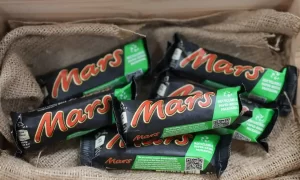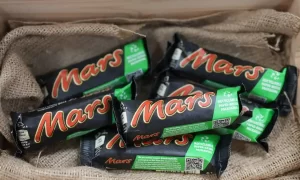
Consumers buying Mars bars at Tesco in the coming days will notice a change: the chocolate bar’s usual plastic wrapper has been swapped for a more environmentally friendly paper one.
The confectionery maker Mars Incorporated is trialling recyclable paper packaging for a limited time, with the bars available at 500 Tesco stores from Monday.
The company is looking to explore different types of packaging, and how these work in everyday life. It added it would use the feedback to inform future packaging pilots.
Crisps, chocolate and cheese have traditionally been regarded as the worst foods for packaging recyclability, and big brands have previously come under pressure from customers and campaigners to do more to swap their wrappers to help the environment.
Mars is not the first confectionery firm to try trading in its traditional wrapping for something a bit more green.
It follows the move by Quality Street to ditch its traditional foil and plastic wrappers for recyclable paper before last Christmas.
The change, made by the brand owner, Nestlé, marked the end of shiny plastic wrappers for the first time since its launch in 1936, in favour of a kind of packaging collected by most local authorities for nine of its 11 sweets.
The orange crunch and green triangle remained in their existing foil wrappers, as these were not wrapped in a layer of plastic.
At the same time, Nestlé also announced it was switching KitKat wrappers to 80% recycled plastic, allowing them to be recycled at supermarkets across the UK or put in household recycling in Ireland.
Mars said it was “exploring different types of alternative packaging solutions” for its confectionery products.
Richard Sutherland-Moore, a packaging expert at Mars Wrigley UK’s research and development centre, said: “For Mars bar, the challenge was to find the right paper packaging solution with an adequate level of barrier properties to protect the chocolate whilst guaranteeing the food safety, quality and integrity of the product to prevent food waste.”
Mars said it is investing hundreds of millions of pounds to redesign thousands of types of packaging, and meet its goal of reducing the use of virgin plastics by a quarter in the short-term, while also increasing its use of recycled plastic in its packaging.
Andrew Flood, a packaging development manager at Tesco, said Mars’s trial of its new Mars bar packaging aligned with the retailer’s own “strategy of removing plastic and packaging in our business where we can, reducing it where we can’t, reusing more and recycling what’s left”.
Not all attempts at cutting back on the use of plastic food packaging have proved a success with shoppers, however.
In April, Sainsbury’s had to defend its move to vacuum pack all of its beef mince, becoming the first UK retailer to do so, after customers criticised the new packaging as “very medical”, “too compressed” and “vile”.
Responding to the criticism, the supermarket said the new packaging would more than halve the amount used per pack – helping to save 450 tonnes of plastic a year – and told shoppers the mince in the new packets was “exactly the same out of the same machines” as in previous packs.
Read more:
Mars bar wrappers changed to paper from plastic in UK trial

